In the dynamic landscape of contemporary business, where competition is fierce and customer preferences constantly evolve, the use of lead generation tools emerges as a strategic necessity. First let’s delve into the pivotal importance of leveraging lead generation tools and highlights how they can empower businesses to not only survive but thrive in the digital age.
The Evolving Landscape of Lead Generation
The traditional methods of lead generation, reliant on manual processes and generic outreach, have gradually given way to more sophisticated approaches. Today, the art of capturing potential customers’ interest requires a data-driven, targeted, and personalized approach. This is precisely where lead generation tools come into play, transforming the way businesses identify, engage, and nurture leads.
Enhanced Customer Engagement
In an era marked by the empowerment of the consumer, personalized engagement is paramount. Lead generation tools equip businesses with the capability to tailor their outreach to individual leads based on their behaviors, preferences, and interactions. Through dynamic segmentation and automated nurturing, these tools ensure that every interaction is relevant and meaningful. This personalized approach not only increases the chances of conversion but also fosters a stronger connection between the brand and the lead.
Time and Resource Optimization
Manually sifting through an extensive list of potential leads is not only time-consuming but also prone to human error. Lead generation tools alleviate this challenge by automating various aspects of the lead generation process. From data collection and analysis to follow-up communication, these tools free up valuable time and resources that can be redirected towards other critical business activities. This efficiency not only accelerates the lead conversion cycle but also enhances the overall productivity of the organization.
Data-Driven Decision Making
Effective lead generation is not a shot in the dark; it is a strategic endeavor guided by insights and data. Lead generation tools provide businesses with a wealth of information about lead behavior, preferences, and engagement patterns. This data serves as a treasure trove for decision-makers, enabling them to refine their strategies, adjust their approaches, and optimize their campaigns for better results. In a rapidly changing market, data-driven decision-making is a competitive advantage that can make the difference between success and stagnation.
Staying Ahead of the Competition
The business landscape is characterized by fierce competition, and staying ahead requires constant innovation and adaptation. Lead generation tools provide businesses with a technological edge that can set them apart. By harnessing the capabilities of these tools, companies can demonstrate their commitment to leveraging cutting-edge solutions to meet customer needs. This not only attracts potential leads but also positions the business as a forward-thinking industry leader.

In the fast-paced world of modern business, lead generation stands as a cornerstone for growth and success. As organizations vie for the attention of potential customers, the ability to identify, engage, and convert leads into loyal clients has become paramount. Fortunately, the digital age has birthed an array of lead generation tools and software designed to streamline this process. Let’s explore the 11 best lead generation tools and software in 2023, each equipped to empower businesses with cutting-edge capabilities.
Compositor.Digital: The Most Innovative Lead Generation Tool in 2023

Attract new prospects by offering your visitors an interactive experience. Not only will you get visitor’s name and email address but also an image that they have generated using the tool. This is especially effective when combined with an incentive such as a contest or sweepstakes. Compositor is simple but that doesn’t mean it’s not powerful. Integrate it with thousands of apps. Send the leads straight to HubSpot or any other CRM or marketing automation software. Don’t just expect users to fill in opt-in forms. Make them have fun while doing so.
- Pros:
- Focus on dwell time and lead capture.
- Offer a unique interactive content experience.
- Intuitive interface, no learning curve, easy to get started.
- Significantly increase visitors’ time spent on website.
- Cons:
- Limited in scope compared to comprehensive marketing suites.
- Integrate with other tools for complete lead nurturing.
HubSpot: The All-Inclusive Lead Generation Solution
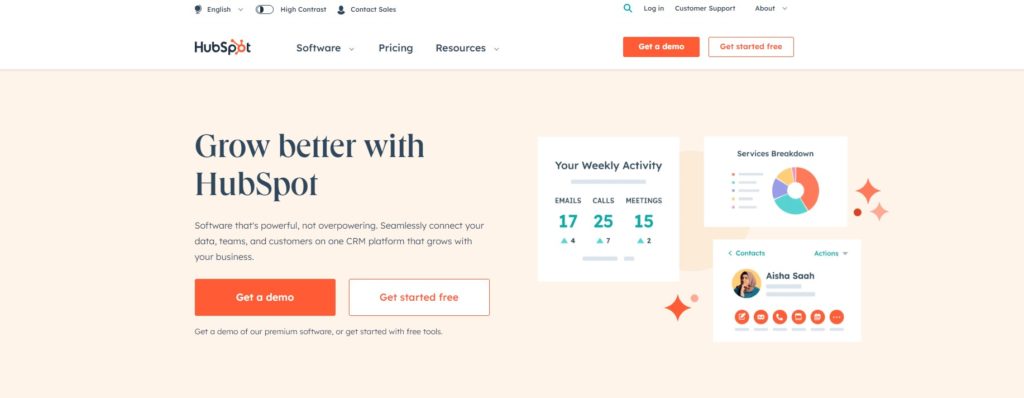
HubSpot reigns as a trailblazer in the realm of lead generation. Offering a comprehensive suite of tools, HubSpot empowers businesses to capture, nurture, and convert leads seamlessly. From intuitive forms and engaging landing pages to advanced lead scoring mechanisms, HubSpot ensures that no lead is left behind. With integration into HubSpot’s CRM and marketing automation, businesses can orchestrate highly targeted and effective lead nurturing campaigns.
- Pros:
- Comprehensive suite for lead generation and nurturing.
- User-friendly interface and easy integration with CRM and marketing automation.
- Advanced lead scoring and segmentation.
- Cons:
- Can be expensive for small businesses.
- Learning curve for beginners.
OptinMonster: Versatility Redefined
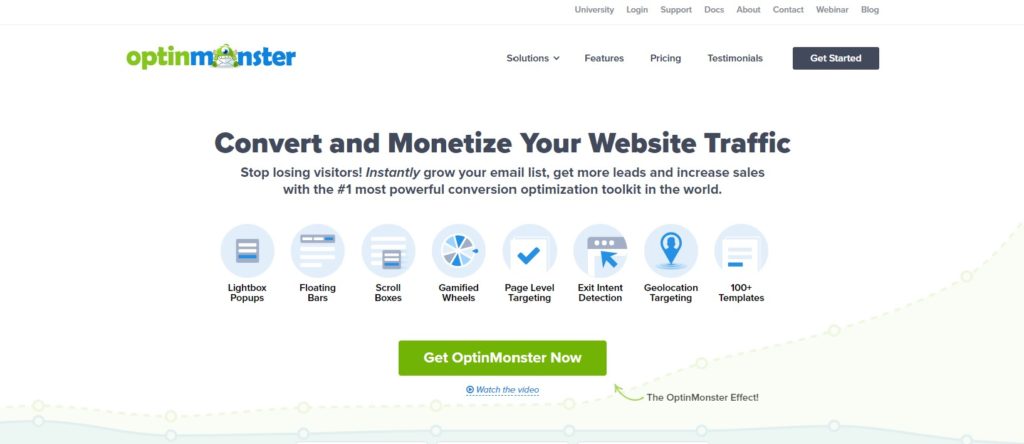
OptinMonster is a powerhouse when it comes to lead capture versatility. Its arsenal includes a range of tools such as pop-ups, floating bars, and exit-intent technology, all designed to engage visitors and convert them into leads. A/B testing and precise targeting options provide actionable insights for optimizing lead generation strategies.
- Pros:
- Versatile lead capture options, including pop-ups and floating bars.
- A/B testing for optimization.
- Integration with popular email marketing platforms.
- Cons:
- Cost might be prohibitive for smaller businesses.
- Pop-ups can sometimes be intrusive if not used thoughtfully.
Leadfeeder: Unmasking Anonymous Website Visitors
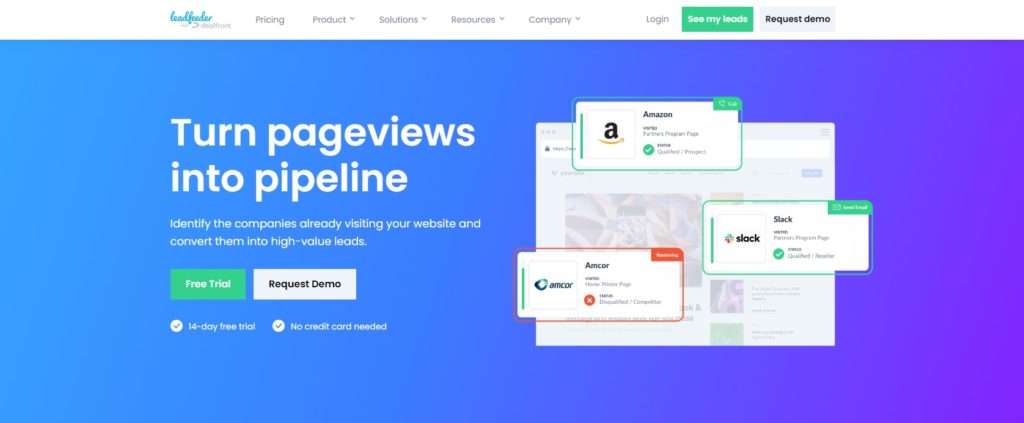
Leadfeeder goes beyond traditional lead capture methods by unmasking anonymous website visitors. By integrating with Google Analytics, it identifies companies visiting your website and provides crucial insights. Lead scoring and tracking functionalities aid in prioritizing leads and delivering tailored engagement.
- Pros:
- Reveals anonymous website visitors and provides valuable insights.
- Simplifies lead tracking and prioritization.
- Integrates with Google Analytics for a holistic view.
- Cons:
- Limited interaction features compared to other tools.
- May require additional tools for complete lead nurturing.
Mailchimp: Elevating Email Lead Generation
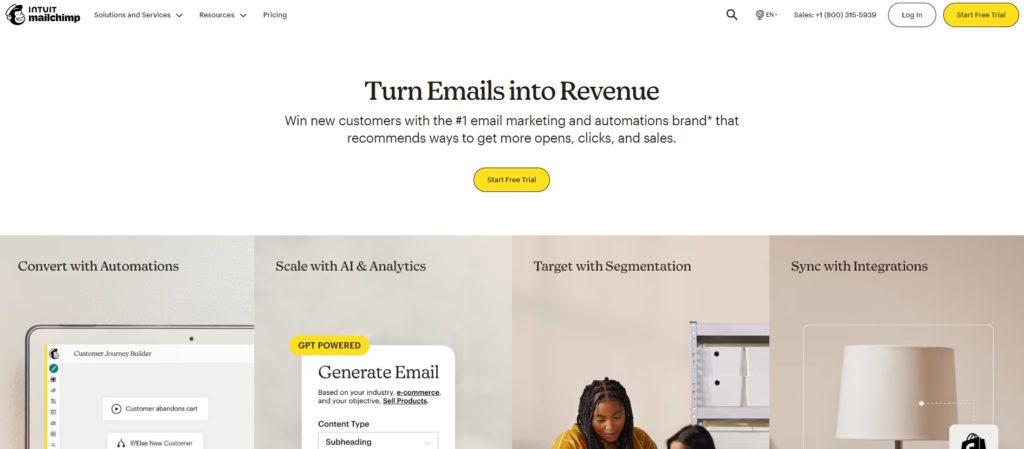
While renowned for email marketing, Mailchimp also offers robust lead generation tools. Its sign-up forms and landing pages seamlessly capture leads, which can then be nurtured using the platform’s powerful email marketing capabilities. Integration with customer journey mapping and marketing automation ensures a holistic lead management approach.
- Pros:
- Well-known for email marketing capabilities.
- User-friendly interface and easy lead capture.
- Integration with other marketing tools.
- Cons:
- Focus primarily on email marketing.
- Advanced features may require a higher pricing tier.
Drift: Conversational Marketing at its Finest

Drift revolutionizes lead engagement through conversational marketing. Its chatbot and live chat features facilitate real-time interactions, nurturing leads through personalized engagement. AI-powered lead qualification and routing further enhance the efficiency of the lead generation process.
- Pros:
- Real-time conversational marketing and chatbot features.
- AI-powered lead qualification and routing.
- Enhanced user engagement and personalized interactions.
- Cons:
- Complex setup and configuration.
- Higher learning curve for effective usage.
Snov.io: Mastering Email Outreach

Snov.io specializes in email lead generation, offering tools for finding and verifying email addresses. Its email outreach and drip campaign functionalities allow businesses to engage leads systematically. The browser extension streamlines lead sourcing, making it a valuable asset for any lead generation strategy.
- Pros:
- Email finder and verifier tools for lead sourcing.
- Drip campaigns for systematic outreach.
- Browser extension for seamless lead capture.
- Cons:
- Limited in scope compared to all-in-one solutions.
- Heavy reliance on email-based lead generation.
Intercom: Captivating Leads Through Conversations

Intercom empowers businesses to capture leads through personalized conversations. Its messaging platform allows for targeted interactions, engaging visitors and guiding them through the sales funnel. Integration with various tools ensures seamless lead management and nurturing.
- Pros:
- Personalized messaging platform for lead engagement.
- Targeted interactions and lead capture.
- Integration with CRM and automation tools.
- Cons:
- Primarily focuses on communication, not exhaustive lead nurturing.
- Pricing can increase as features are added.
Salesforce Pardot: Marketing Cloud Account Engagement
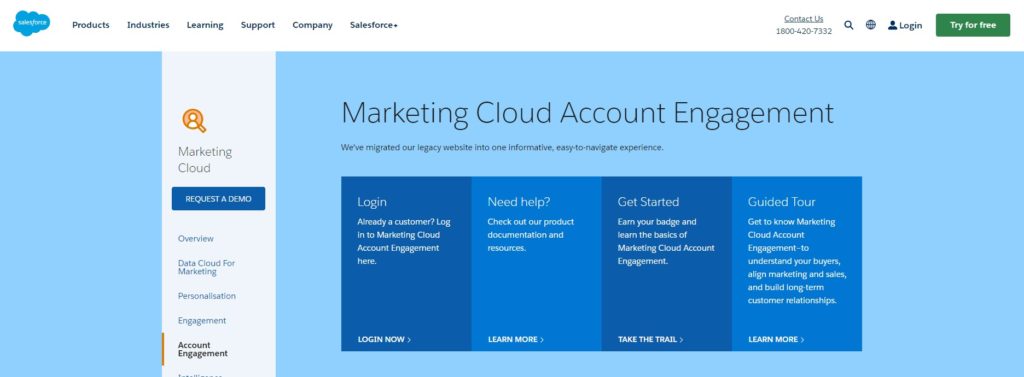
Salesforce Marketing Cloud Account Engagement (formerly Pardot) caters to B2B lead generation with its marketing automation prowess. From lead nurturing to scoring, it optimizes the lead journey. Integration with Salesforce CRM enhances lead management, enabling businesses to make data-driven decisions.
- Pros:
- B2B marketing automation and lead nurturing.
- Seamless integration with Salesforce CRM.
- Advanced lead scoring and tracking.
- Cons:
- Complex setup and implementation.
- Higher pricing point, particularly for smaller businesses.
LinkedIn Sales Navigator: The Power of Social Selling
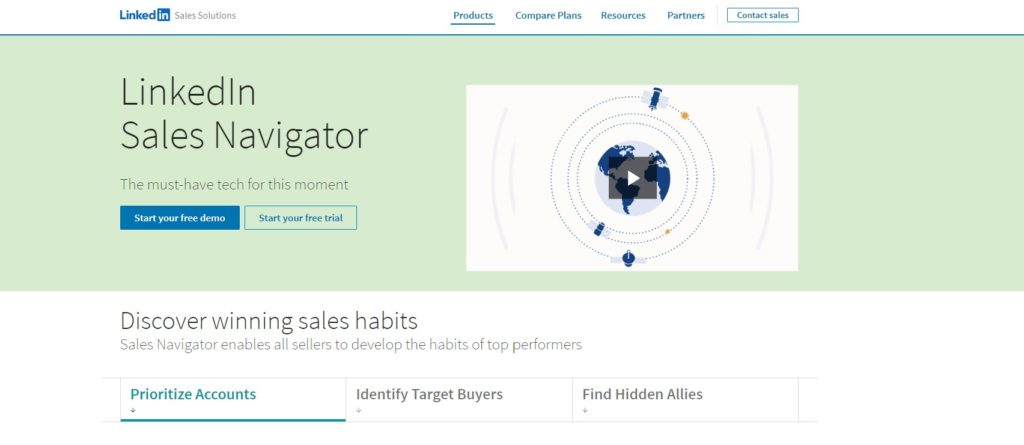
LinkedIn Sales Navigator harnesses the power of social selling for lead generation. With lead search and recommendations, businesses can identify prospects within their network. The InMail feature enables personalized outreach, forging meaningful connections.
- Pros:
- Leverages social selling for lead identification.
- Utilizes LinkedIn’s extensive network for prospecting.
- InMail feature for personalized outreach.
- Cons:
- Focus limited to LinkedIn and its user base.
- May require additional tools for broader lead nurturing.
Sumo: Driving Traffic and Capturing Leads

Sumo is synonymous with website traffic growth and lead capture. Its list-building tools and social sharing options drive engagement and capture valuable leads. Sumo empowers businesses to expand their online presence while harnessing lead generation potential.
- Pros:
- Focus on website traffic growth and lead capture.
- List-building tools and social sharing options.
- User-friendly interface and easy setup.
- Cons:
- Limited in scope compared to comprehensive marketing suites.
- May require integration with other tools for complete lead nurturing.
There you have it!
In an era where leads are more informed, discerning, and digitally connected than ever before, the significance of lead generation tools cannot be overstated. These tools serve as catalysts for growth, empowering businesses to navigate the complexities of modern marketing with finesse and precision. By embracing lead generation tools, businesses are not only equipping themselves for success in the present but also laying the foundation for a future marked by sustainable growth, heightened customer engagement, and a competitive edge in an ever-evolving marketplace.
The year 2023 witnesses an impressive array of lead generation tools and software, each catering to unique needs and approaches. From comprehensive suites like HubSpot to specialized tools like Snov.io, businesses have a plethora of options to supercharge their lead generation efforts. These tools not only streamline the process but also elevate engagement, nurturing, and conversion. As businesses navigate the ever-evolving landscape, embracing these lead generation tools becomes imperative for staying ahead in a competitive world. By leveraging these cutting-edge solutions, businesses can propel their growth and establish a strong foothold in their respective markets.

